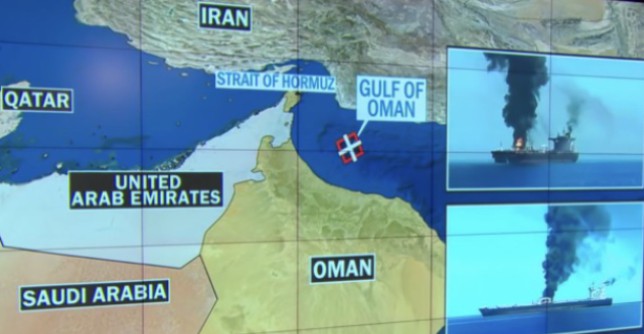The 23rd commandant of the Coast Guard said multilateral agreements and regional constructs have brought stability to other areas that have suffered from criminal activity.
Following the suspected attacks on two tankers last week in the Gulf of Oman, a “multilateral” approach is needed to guarantee access and safety in the Persian Gulf, said retired Coast Guard Adm. Thad Allen, who served as the 23rd commandant of the Coast Guard from 2006 to 2010.
“Ultimately, when you put the security and the defense issues aside, you look at the impact on commerce and the regional economic issues, this needs to be a multilateral regional approach to help solve this problem,” said Allen, who is now the senior executive adviser for HudsonAnalytix, an international business risk solutions company.
He said similar approaches to previous issues — such as piracy in the region of the Horn of Africa and the Gulf of Aden — helped improve safety. The Convention for the Suppression of Unlawful Acts against the Safety of Maritime Navigation signed in March 1988 by 166 parties was a treaty to allow the parties to pass “domestic legislation that would allow them to deal with threats to navigation,” Allen said.
“I realize this is heightened tensions from a security and defense standpoint, but looking at past practices in the Horn of Africa and Strait of Malacca and other places where they’ve had criminal activity, the final solution that’s brought stability are multilateral agreements and regional constructs that allow people to create a common operating picture, create what we call maritime domain awareness and minimize the threats,” he said.
“Right now, most of the ships that are transiting that area are checking in with the U.S. Fifth Fleet for the updates on any threats or risk warnings,” he continued. “But if you want a permanent solution, it has to be an institutionalized regional approach based on a common operating picture, maritime domain awareness and sharing information, so collectively … reduce the risk and help out in response.”
BIMCO, which represents about 60% of the world’s merchant fleet measured by tonnage, also called on nations to cooperate following last week’s suspected attacks.
“We strongly call for nations to do what they can to de-escalate tensions and ensure the safe passage of merchant shipping in the Strait of Hormuz,” Agnus Few, BIMCO CEO and secretary general, said in a statement released Thursday, the day both the Front Altair and Kokuka Courageous were victims of apparent attacks.
Saudi Arabian Energy Minister Khalid al-Falih said Monday that countries need to cooperate to keep shipping lanes open for oil and other energy supplies, Reuters reported. He said Saudi Arabia will protect its own infrastructure and territories, “but sea lanes of global trade need to be protected collectively by other powers as well,” according to Reuters.
Allen said he would first talk to international organizations, such as the International Maritime Organization and BIMCO, to create a common operating picture and pass information that minimizes threats. He said he also would increase safety precautions on the ship, which could include having a more vigilant crew or better defenses on the vessel.
“We shouldn’t be leaping to confrontational alternatives before we haven’t exhausted international governing structures in the way that create a multinational context to deal with this,” Allen said. “I would hope that those conversations are occurring. If not, we’re leaving ourselves with very few options and I don’t think that’s a wise way to move forward.”
The U.S., which has blamed the attacks on Iran, is sending an additional 1,000 troops to the Middle East in response to “hostile behavior” by Iranian forces, Acting Defense Secretary Patrick Shanahan said, according to BBC. They will join about 1,500 troops sent last month.
The U.K.’s Royal Navy also is reportedly set to send 100 Royal Marines to the Gulf to protect British ships, according to The Sunday Times.
Allen said he was involved in planning the deployment of Coast Guard patrol boats to the Persian Gulf to protect tankers under U.S. flag during the tanker war between Iran and Iraq in the 1980s, which included a combined 451 attacks on ships in the Persian Gulf by both countries and resulted in more than 320 casualties, including 116 killed.
The United States ultimately did not deploy the ships, Allen said.
“The real problem is there’s always going to be a vessel somewhere that will be vulnerable and not subject to an escort or other security provisions,” he said. “That’s the reason in the long term escorts may not be the answer because it’s really hard to sustain that, especially if it’s only one nation involved in it. That’s the reason there needs to be some kind of multilateral approach to the problem.”










